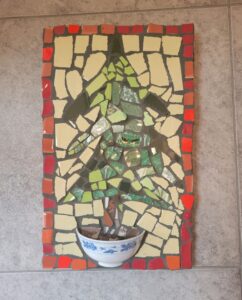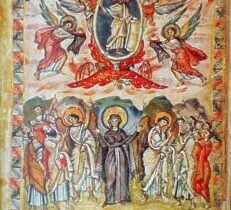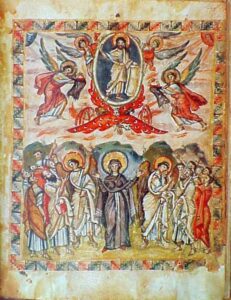Our Choices – Look Back or Look Ahead
 In times of transition, we often feel we must choose between loyalty and nostalgia for “the old ways” and dreams and hopes of “better days ahead.” This is especially true when roles, expectations, and opportunities have changed from older ways to newer ones. Change is never easy and changes that involve our ability to live in society, in our families and with our customary ways of making a living, are particularly hard to manage. All too often it seems that whenever opportunities open for one person or group, they close for others.
In times of transition, we often feel we must choose between loyalty and nostalgia for “the old ways” and dreams and hopes of “better days ahead.” This is especially true when roles, expectations, and opportunities have changed from older ways to newer ones. Change is never easy and changes that involve our ability to live in society, in our families and with our customary ways of making a living, are particularly hard to manage. All too often it seems that whenever opportunities open for one person or group, they close for others.
In point of fact, the notion that if you get something better, then I will, as a direct result, get less of the good thing or even something worse is not truly the way it works out in practice. In anthropology, we call this concept “Limited Good.” In reality, limited good doesn’t actually play out. When one group gets a better opportunity and options for a good life, others from other groups can also benefit. Their opportunities to move ahead are also enhanced. “A rising tide raises all boats” is an expression describing this phenomenon on a societal level. When workers from other nations, for example, come looking for work, those already here who need help caring for livestock, or picking crops, or building homes, or caring for children, find willing help. The newcomers fill a need not easily met by the existing resources of the communities into which they move.
We have two options in these situations. We can look back with nostalgia and seek to return to the good old days – to make something Great again. The other option is to look forward and work to make things better for everyone – to open new opportunities and help those less prepared to be able to move into them. This option lets the rising tide help everyone.
Those who have been left behind when economic opportunities collapse around them are much more likely to believe folks who promise to resolve the problem by tossing out newcomers or others who are different in appearance. It’s all too easy to point fingers and accuse. It’s much harder to offer new, attractive opportunities that are open to all.
In the world today and in the Church, we are in a time of transition once again. The gap between income/opportunities for the very wealthy and those open to the very poor and even those in the middle has been increasing dramatically. We see this around the world, both in terms of individuals and in terms of nations. It happens again and again. Sometimes very rapidly.
How do we move forward to bring opportunities for health, safety, education, housing, nutrition and hope to all? Do we look back and try to recreate some of those “good old days” that seem so attractive in the movies? Or do we recognize that those days may have been good for some of us, but were quite restrictive for others of us? Is it really the case, for example, that as women or members of minority groups have opportunities for education, men necessarily have fewer opportunities? Or is it possible, instead, that we can find ways for both men and women of many different backgrounds to bring valuable skills and insights to their jobs, communities, and families – loving, respecting, and supporting each other in the process? In the Church, how will being open to hear the voices of everyday people enhance the mission of sharing the message of the Kingdom of Love?
All of this comes to mind as I reflect on the experience of the disciples during the period after the Resurrection. For forty days, Jesus showed up among them and continued to teach them. He clearly was alive. What was not clear were the implications of his return from death. Also, at least at first, they didn’t always recognize him at first glance. He was different. He still spoke of the Kingdom, as he had before his passion, death, and resurrection, but what did that mean? He reminded them of “the promise of the Father” that they would be “baptized with the Holy Spirit.” But what did that mean? (Lk 24:46-53)
So they did what people so often do. They drew on their prior experience and expectations. “Lord, are you at this time going to restore the kingdom to Israel?” Can we go back to the good old days and Make Israel Great Again? After all, someone who can rise from the dead ought to be able to defeat the greatest power in the world – Rome! And then We could be the ones in charge – the rulers of the world…
But Jesus was not tempted by this thought. Again, he reminded the disciples that times and seasons of the Father’s plans for the world were not for humans to know in advance. What was important to know and remember was just one thing. They would receive power when the Holy Spirit came to them and they would become witnesses of what they had seen. This witness was not to be confined to their local families and communities in Galilee. They would speak in Jerusalem, and also in Judea, Samaria, and out into the rest of the world.
The first step was to stay in Jerusalem and wait for this gift. With that promise, he was taken from their sight – lifted away. Two men in white clothing suddenly were there with them and reminded them to return to Jerusalem, promising that Jesus would return one day. (Acts 1:1-11)
The disciples were not to try to recreate the good old days of traveling with Jesus from town to town and witnessing the miracles he worked. They were to go out, and through their witness, wonders would be worked. People would see new options for living with each other as a community. The poor would receive help. The oppressed would find freedom. And most wondrously, all would have the chance to know the love of the Father through the caring of the community of Followers of the Way of Jesus.
Nine days passed, then on the feast of Pentecost, the promise of the coming of the Spirit was fulfilled.
For now, as we celebrate the Ascension and in these coming days we remember the time of waiting between the Ascension and Pentecost, we pray. Jesus was taken into heaven, and as a result of the Father’s gift, humans would receive the Spirit of wisdom and revelation (Eph 1:17-23) – enlightenment to see the hope and riches of the glory of the Lord inherited by all through Jesus, our high priest. (Heb 9:24-28; 10:19-23)
We are called to be people of hope – people who look forward, building a world in which everyone has opportunities for lives of dignity and hope.
May we this week remember to trust the Spirit to work among us and come upon us once again, in all the power and joy and hope of the family of God. We can do great things, but only when we trust that doors will open, opportunities will arise, and the Lord will work through our simple actions of love and caring for those we meet.
Readings for the Solemnity of the Ascension of the Lord – Cycle C
Read More














